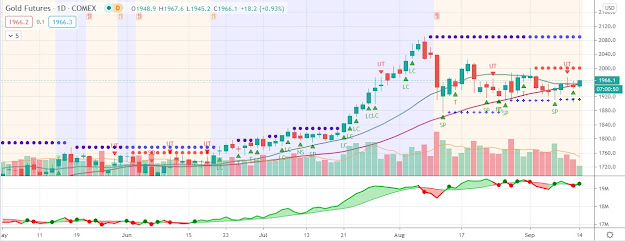Gold can react sharply to any prospect of more QE in the United States
The gold price stabilized near $1,695 per ounce on Wednesday as
financial markets remained in consolidation mode ahead of tomorrow’s
European Central Bank (ECB) meeting. The price of gold
held in a tight range between $1,689 and $1,697 in overnight trading
after briefly surpassing the $1,700 level yesterday. The U.S. Dollar
Index dipped 0.1% to 81.257 this morning, while the euro rose 0.2% to
1.2598 against the greenback.
The gold price held firm this morning after a worse than expected report on economic activity in the euro zone. A survey of purchasing managers fell from 47.9 in July to 47.2 in August – slightly below the 47.5 level economists were expecting and well under the 50 level that separates expansion from contraction. The disappointing data underscored the headwinds that the euro zone continues to face as it struggles to combat the sovereign debt crisis.
The price of gold is likely to “challenge $1,800/oz before year-end,” according to metals consultancy firm GFMS. In an update to its April 2012 Gold Survey, GFMS attributed its bullish outlook on the yellow metal in large part to rising investment demand and the likelihood of further monetary easing in the U.S. and Europe. Philip Klapwijk, global head of metals analytics at GFMS – a unit of Thomson Reuters – commented that “I think we’re on pretty safe ground saying that we’ve already seen the lows for the year and that firmer prices, particularly towards year-end, are on the cards.”
“We’ve recently seen how gold can react sharply to any prospect of more QE in the United States and we’re fairly confident that some form of easing is more likely than not in the end,” Klapwijk added. “We have seen periodic items of good news on the US economy but that invariably seems followed by bad. This is all before a probable slowdown in both European and Chinese economic growth. Neither can ignore its domestic problem of the fiscal cliff, with all the uncertainty and recessionary potential bound up in that.”
Dannesboe’s comment came after ECB President Mario Draghi urged euro zone officials earlier this week to approve a bond-buying program aimed at capping interest rates in several of the PIIGS nations. Draghi faces considerable opposition, however, from the Bundebank – Germany’s own central bank – which remains very concerned that such money printing measures would constitute the financing of fiscal deficits for such debt-strapped countries as Spain and Italy.
As for the gold price, Dannesboe stated that “I’m not a super bull on gold because there’s not enough ETF (exchange-traded funds) buying to call for a new high, but there’s enough reason to believe that in the short term speculators will buy gold given the context of quantitative easing.”
The gold price held firm this morning after a worse than expected report on economic activity in the euro zone. A survey of purchasing managers fell from 47.9 in July to 47.2 in August – slightly below the 47.5 level economists were expecting and well under the 50 level that separates expansion from contraction. The disappointing data underscored the headwinds that the euro zone continues to face as it struggles to combat the sovereign debt crisis.
The price of gold is likely to “challenge $1,800/oz before year-end,” according to metals consultancy firm GFMS. In an update to its April 2012 Gold Survey, GFMS attributed its bullish outlook on the yellow metal in large part to rising investment demand and the likelihood of further monetary easing in the U.S. and Europe. Philip Klapwijk, global head of metals analytics at GFMS – a unit of Thomson Reuters – commented that “I think we’re on pretty safe ground saying that we’ve already seen the lows for the year and that firmer prices, particularly towards year-end, are on the cards.”
“We’ve recently seen how gold can react sharply to any prospect of more QE in the United States and we’re fairly confident that some form of easing is more likely than not in the end,” Klapwijk added. “We have seen periodic items of good news on the US economy but that invariably seems followed by bad. This is all before a probable slowdown in both European and Chinese economic growth. Neither can ignore its domestic problem of the fiscal cliff, with all the uncertainty and recessionary potential bound up in that.”
Dannesboe’s comment came after ECB President Mario Draghi urged euro zone officials earlier this week to approve a bond-buying program aimed at capping interest rates in several of the PIIGS nations. Draghi faces considerable opposition, however, from the Bundebank – Germany’s own central bank – which remains very concerned that such money printing measures would constitute the financing of fiscal deficits for such debt-strapped countries as Spain and Italy.
As for the gold price, Dannesboe stated that “I’m not a super bull on gold because there’s not enough ETF (exchange-traded funds) buying to call for a new high, but there’s enough reason to believe that in the short term speculators will buy gold given the context of quantitative easing.”




Comments
Post a Comment